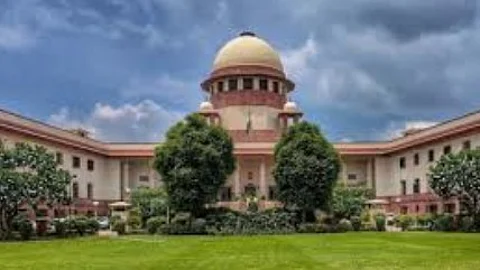

In a significant ruling, the Supreme Court on Monday upheld the legality of naming government welfare schemes after political leaders, setting aside a Madras High Court order that barred the Tamil Nadu government from launching a scheme bearing Chief Minister MK Stalin's name.
The apex court also imposed a fine of ₹10 lakh on AIADMK Member of Parliament C Ve Shanmugam, the petitioner in the case, for selectively challenging only the DMK-led state government’s scheme while ignoring similar initiatives at both the state and national levels. The amount is to be deposited with the state government and utilised for schemes benefiting the underprivileged.
A bench led by Chief Justice of India (CJI) Bhushan R Gavai, along with Justices K Vinod Chandran and NV Anjaria, observed, “Launching schemes in the name of political leaders is a practice prevalent across India. The petitioner’s decision to target only one political party and its leader indicates a biased motive.”
The bench dismissed the petitions and emphasised that courts should not be used as platforms for political vendettas. “Political battles are meant to be fought at the ballot box, not in courtrooms,” the bench asserted.
The ruling came in response to appeals filed by the Tamil Nadu government and the ruling DMK party, challenging a July 31 interim order by the Madras High Court. The High Court had directed that while launching and promoting government welfare schemes, the names or images of living persons, former chief ministers, ideological leaders, or party symbols should not be used.
Criticising the petitioner for filing the plea just days after submitting a representation to the Election Commission of India (ECI) seeking the suspension of DMK’s recognition, the Supreme Court called the move premature and a misuse of judicial process. “The petitioner showed impatience and even claimed that the ECI failed to act within three days,” the court noted.
Appearing for the DMK, senior advocates Mukul Rohatgi and P Wilson argued that the High Court had misinterpreted prior Supreme Court rulings related to the use of public funds for political propaganda. Rohatgi clarified that while earlier judgments discouraged glorification, subsequent rulings allowed the use of leaders' photos in government advertisements, provided they were relevant to the scheme.
Senior advocate Abhishek Manu Singhvi, representing the state government alongside Advocate General PS Raman, pointed out that no judgment prohibited the use of a political leader's name. Raman also submitted a list of 45 welfare schemes across India named after various leaders, including 23 schemes introduced under former CM J Jayalalithaa—popularly known as “Amma”—when the petitioner himself was a minister in the AIADMK-led government.
Senior advocate Maninder Singh, representing the petitioner, clarified that the objection was limited to using CM Stalin’s name, not the scheme’s operation. However, the court dismissed this argument, stating that such selective objections undermine the integrity of legal proceedings.
The verdict is expected to set a precedent and bring clarity to the long-debated issue of politicisation in government welfare initiatives.
(This story is published from a syndicated feed)